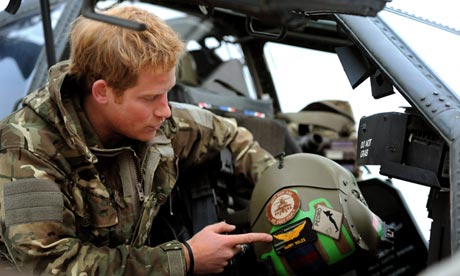That war is first taught as a game is no secret. For thousands of years young males have been introduced to war through figurines, wooden swords, wrestling, races and similar means developed by their fathers, whose own war games train themselves for the real thing. More recently, 20th century flight simulations and technological advances have blended with consumer electronics to transmit war onto a screen, both outside and inside the battlefield.
"It's a joy for me because I'm one of those people who loves playing PlayStation and Xbox, so with my thumbs I like to think I'm probably quite useful," Britain's Prince Harry said during interviews released upon his return from Afghanistan.
Explaining his four-month role as co-pilot of an Apache attack helicopter, Harry described the thrill of emergency response and the weapons systems he controlled in the gunship's two-man cockpit: Hellfire air-to-surface missiles, rockets and a 30-millimetre gun. Such statements are hardly surprising or shocking, but asymmetric warfare is fought along information lines and consumes anything in its path. Despite being cleared by the Ministry of Defense, Harry's comments quickly attracted negative press (targeting his princely qualities) and spurred a few grimaces on the MOD's own face.
"I'm not going to second guess whether he should or shouldn't have said it," spokesman Jim Murphy told the Guardian. "He's obviously a young and brave man. He was candid. Perhaps he may have been more candid than the Palace may have wished."
The Taliban naturally pounced on Harry's statements after failing to kill or capture him as promised. Spokesman Zabiullah Mujahid announced that, "49 countries with their powerful military failing in the fight against the mujahideen, and now this prince comes and compares this war with his games, PlayStation or whatever he calls it." Easily assailing the Prince for the flippant perception of his comments, Mujahid's counterattack appealed to any Afghan who loathes the notion of Afghanistan being treated as a game board for Westerners - from Britain and Russia's "Great Game" in the 1830s to the Soviet and NATO invasions nearly 200 years later. In this sense the disrespect of a "game" is very real in Afghanistan.
"This is a serious war, a historic war, resistance for us, for our people," Mujahid says.
However Harry's interviews are unlikely to make any immediate impact in Afghanistan. His testimony only confirms a new technological phase of an established pattern in war, and most Afghan civilians won't react as though he just murdered an innocent family or burned a Quran. Efforts to connect Harry's "mental problems" with the prolonged nature and brutality of Afghanistan's war may have more effect in Western countries than Afghan villages. Even Mujahid admits, "we don't take his comments very seriously, as we have all seen and heard that many foreign soldiers, occupiers who come to Afghanistan, develop some kind of mental problems on their way out."
More dangerous is the impetus to stage new Taliban attacks on Western targets in Kabul or elsewhere, which will be attributed to Harry's statements. Another factor to monitor outside Afghanistan is the public opposition of American video games set in foreign countries. These war games strike a cord with a variety of individuals, both the politically liberal and religiously conservative, who don't relate to the glamorous gamer side of war. The Trench has spoken with Yemenis who view Black Ops II's use of their country as gratuitous (try searching Yemen on YouTube), and some Pakistanis are beginning to organize a boycott against Call of Duty. Although the influence of these games on actual battlefields is minimal, public perceptions are crucial in counterinsurgency's wider scope and cannot be ignored at any size.
Any American force that generates anti-Americanism in a counterinsurgency environment is cause for concern.
Most disturbing are the long-term potentialities of advanced technological warfare: namely the gradual removal of humans from the killing process. Advocates of automated warfare argue that humans maintain control of the machine, a defense that is largely true for the moment but could break down over time. Drones may be more or less corruptible to enemy actors than humans; the process of this military experiment should be chaotic. Ultimately, whole fleets of drones could be concentrated in the hands of a small group or even one individual, further removing the human element from war. Drones could also be armed with weapons of mass destruction in the future.
Dehumanization is a constant theme of war - humanity might not be able to kill as it does without it. Problematically, all of these concerns and many others won't be eagerly addressed by Western governments or mainstream media.


Harry is losing his own country and doesn't even know it, Muslim invitees of his own government are out breeding his own ancestors 10-1 on his own lands (literally), his own mum was dating a Muslim man at the time of her death, primarily for his wealth and national spite-and possibly fashion sense too.
ReplyDeleteHarry wants to die, he has nothing to fight for.